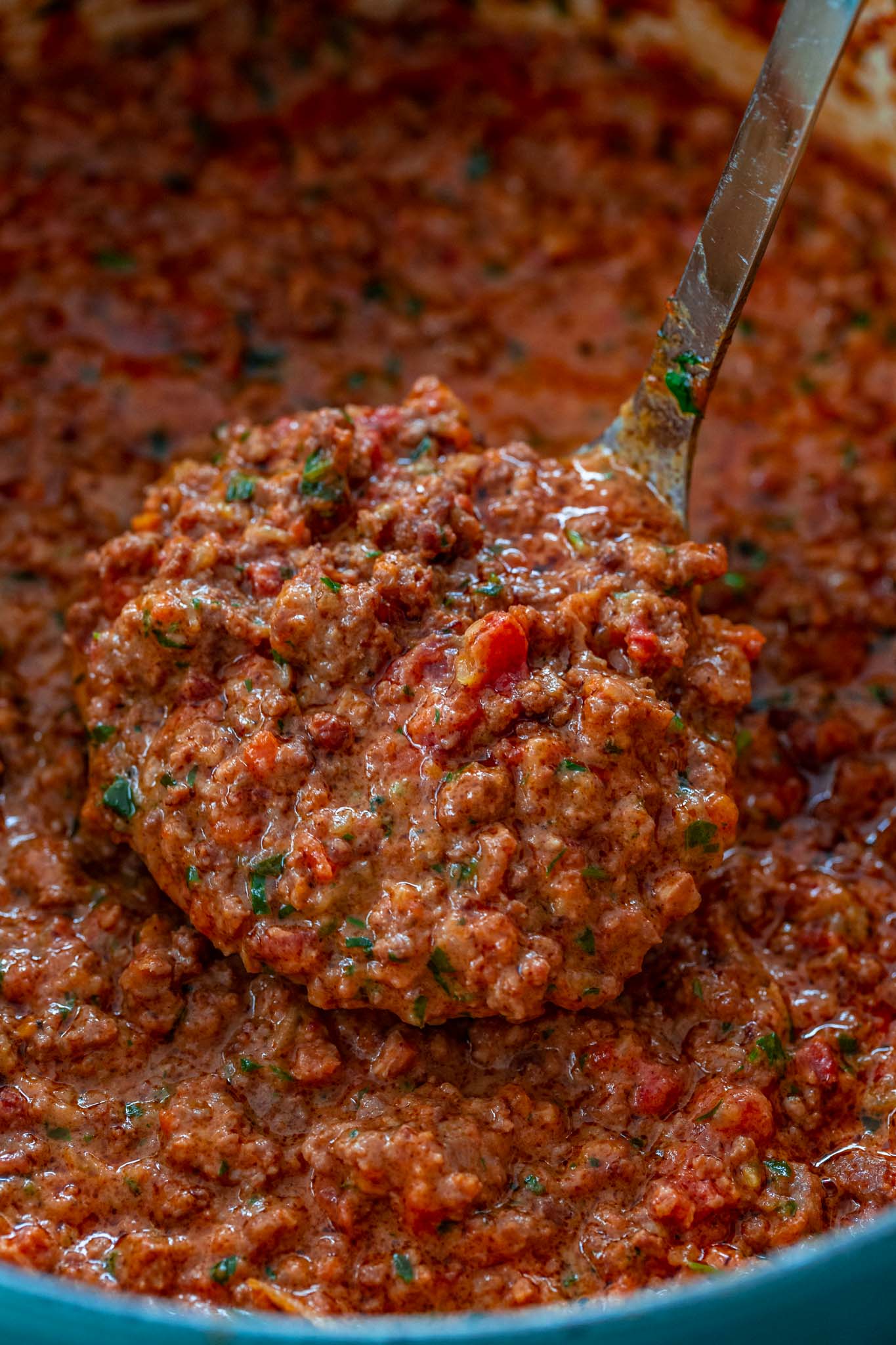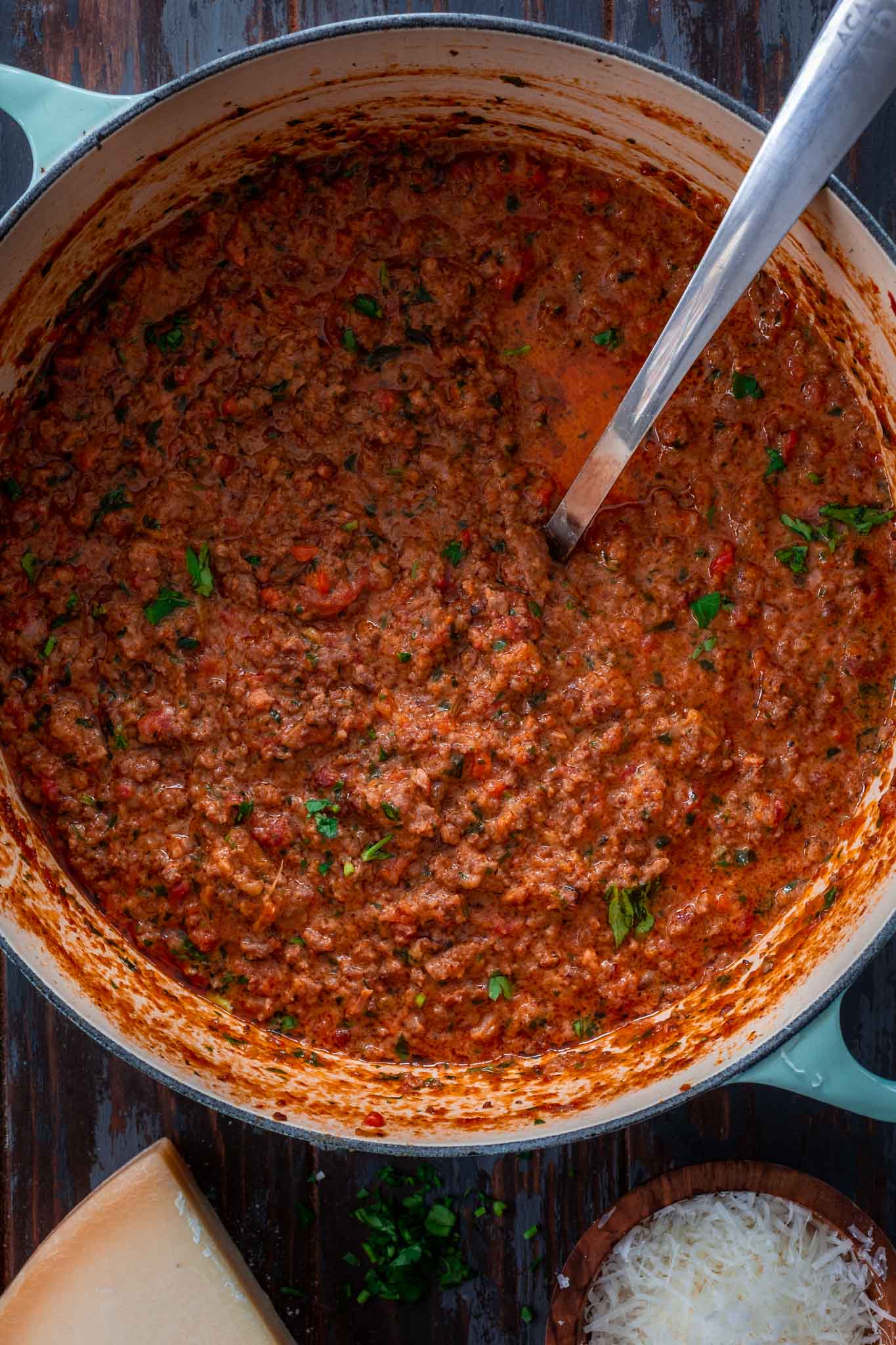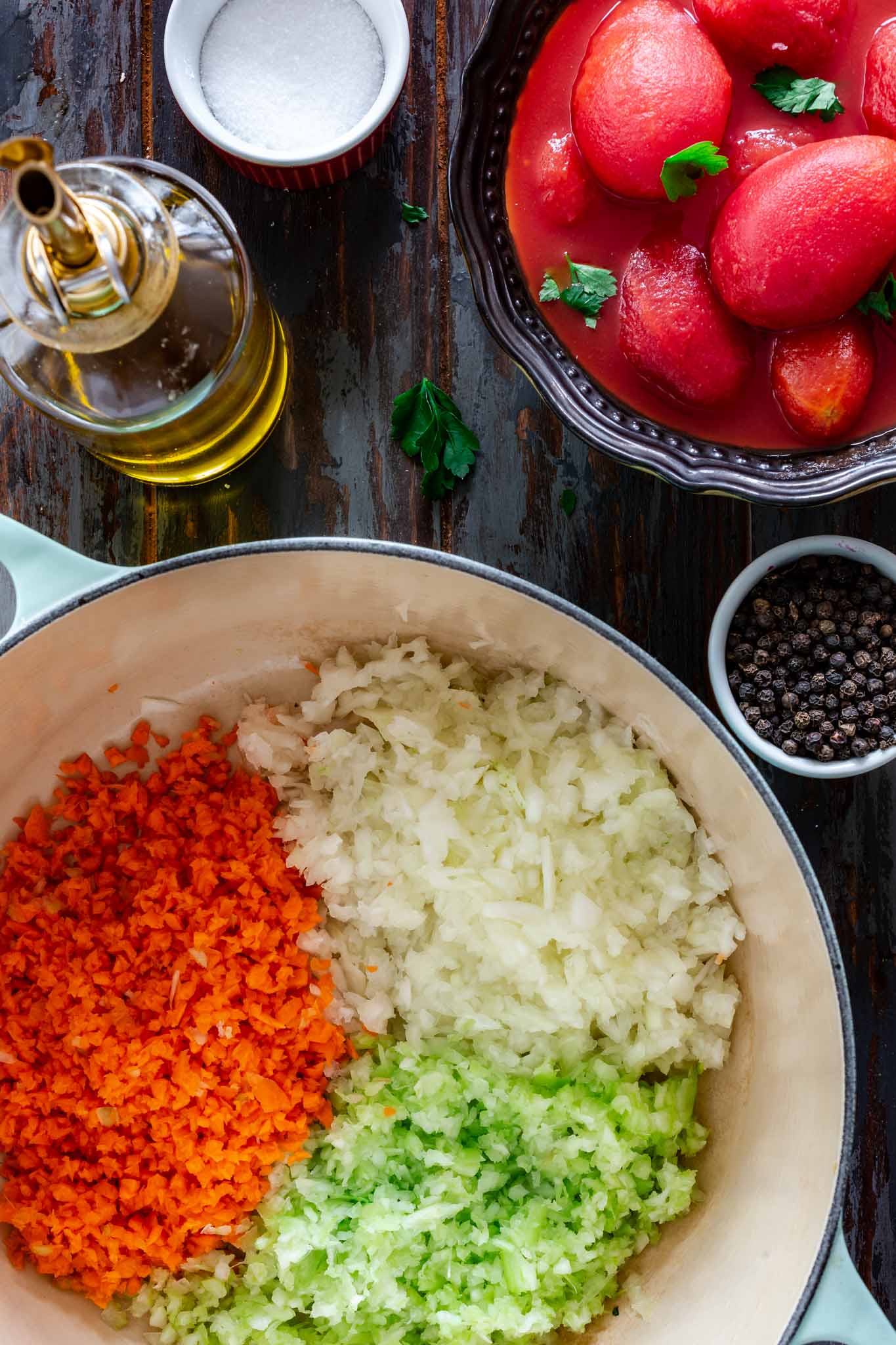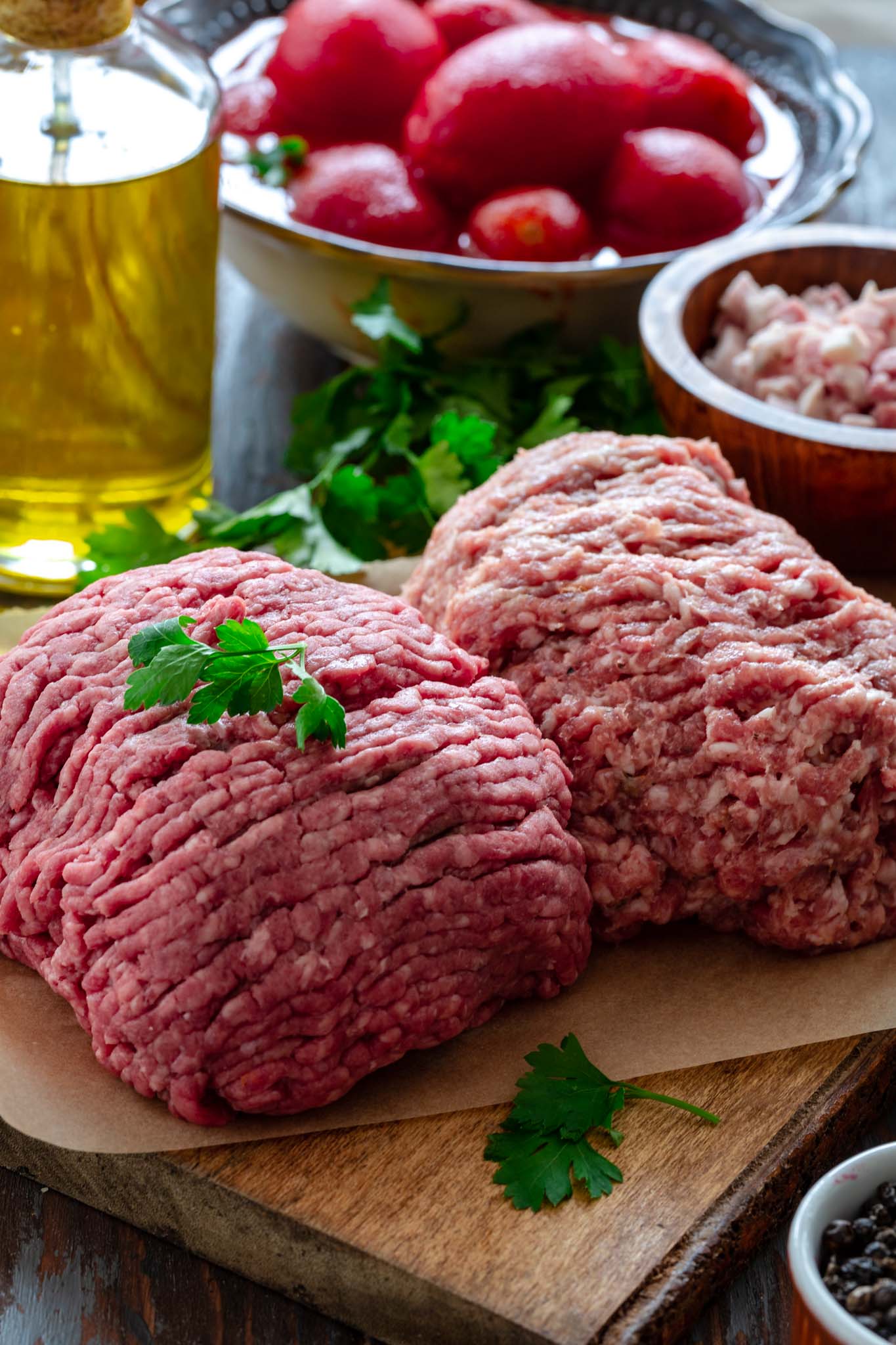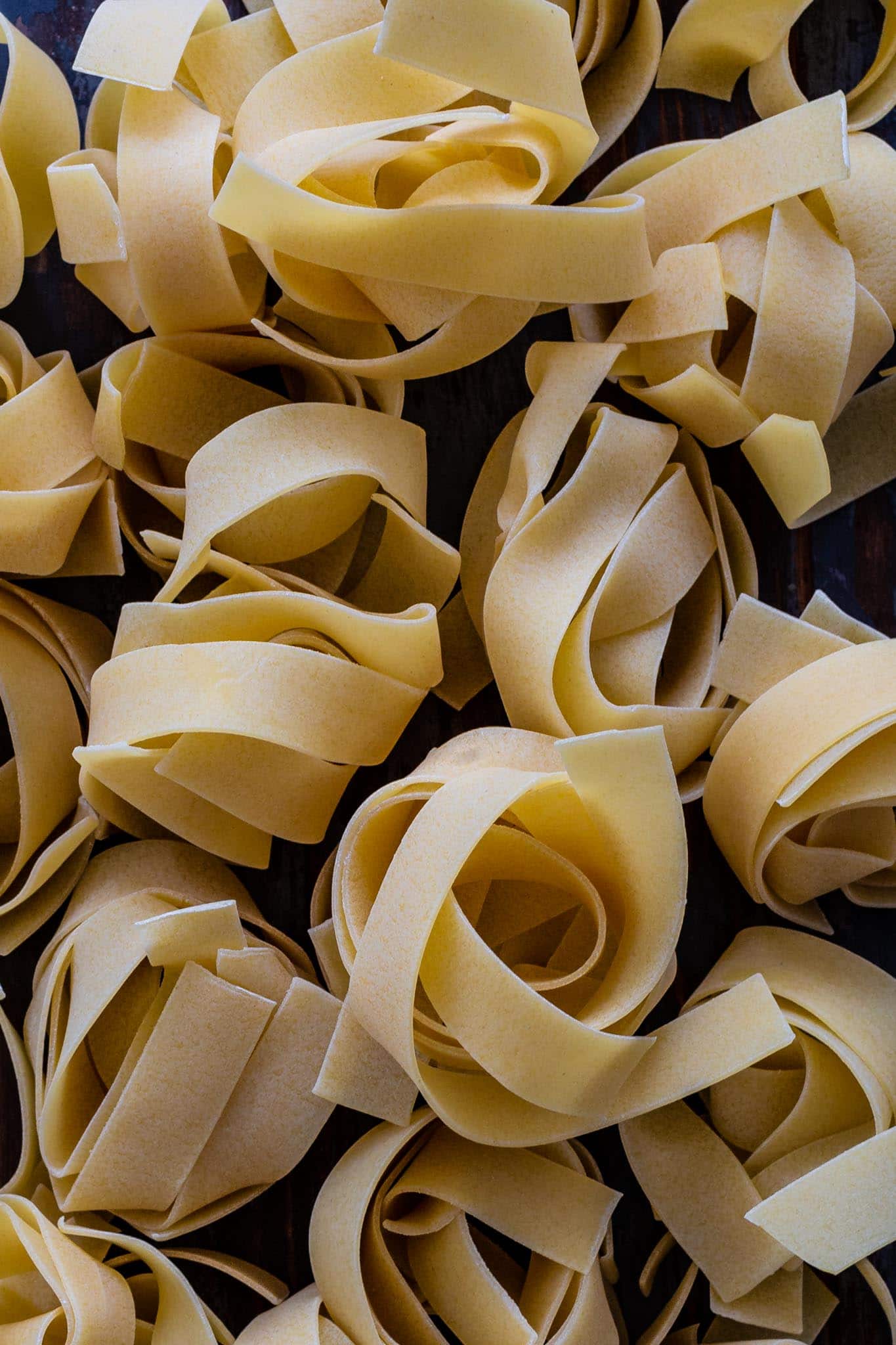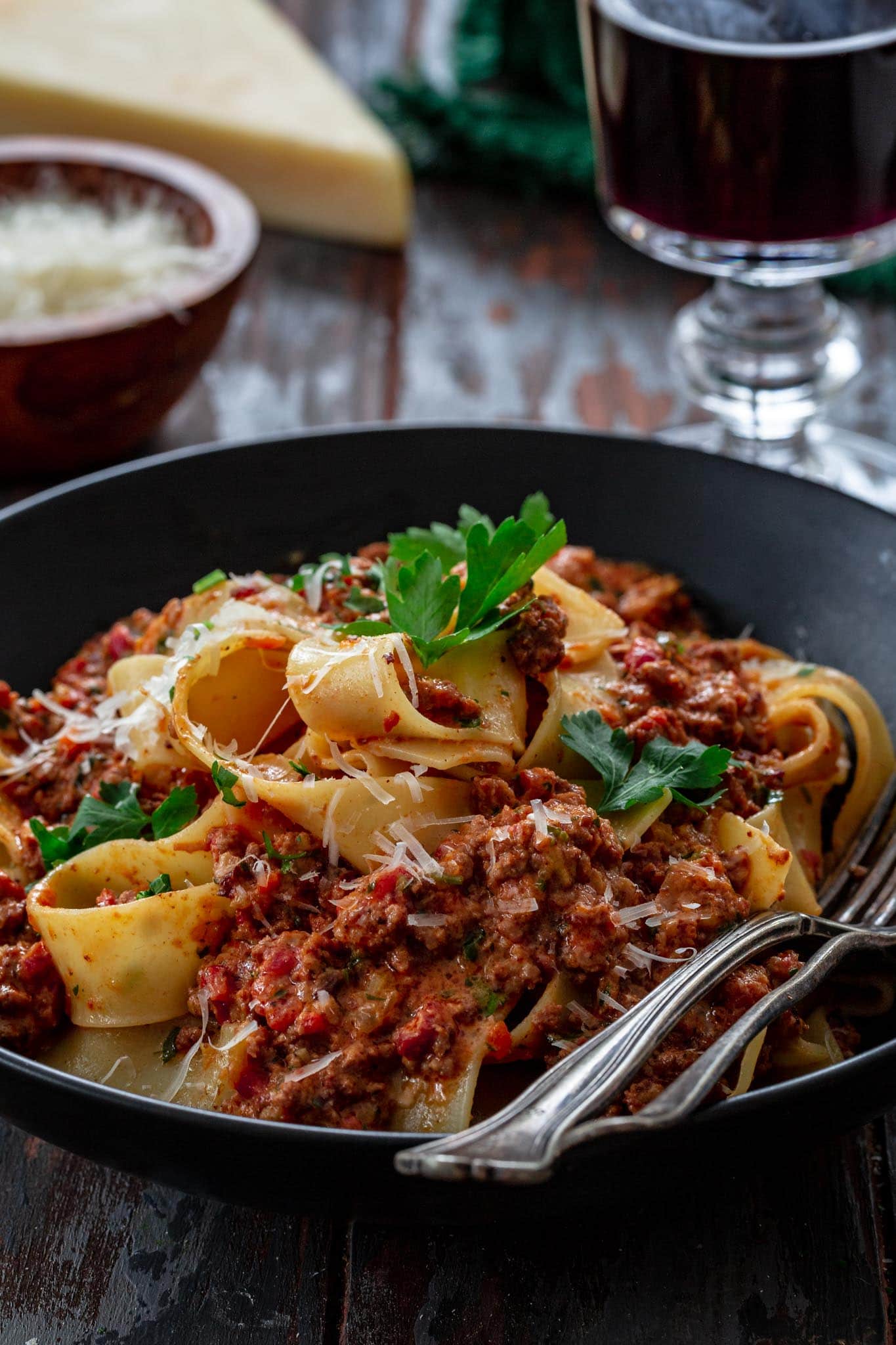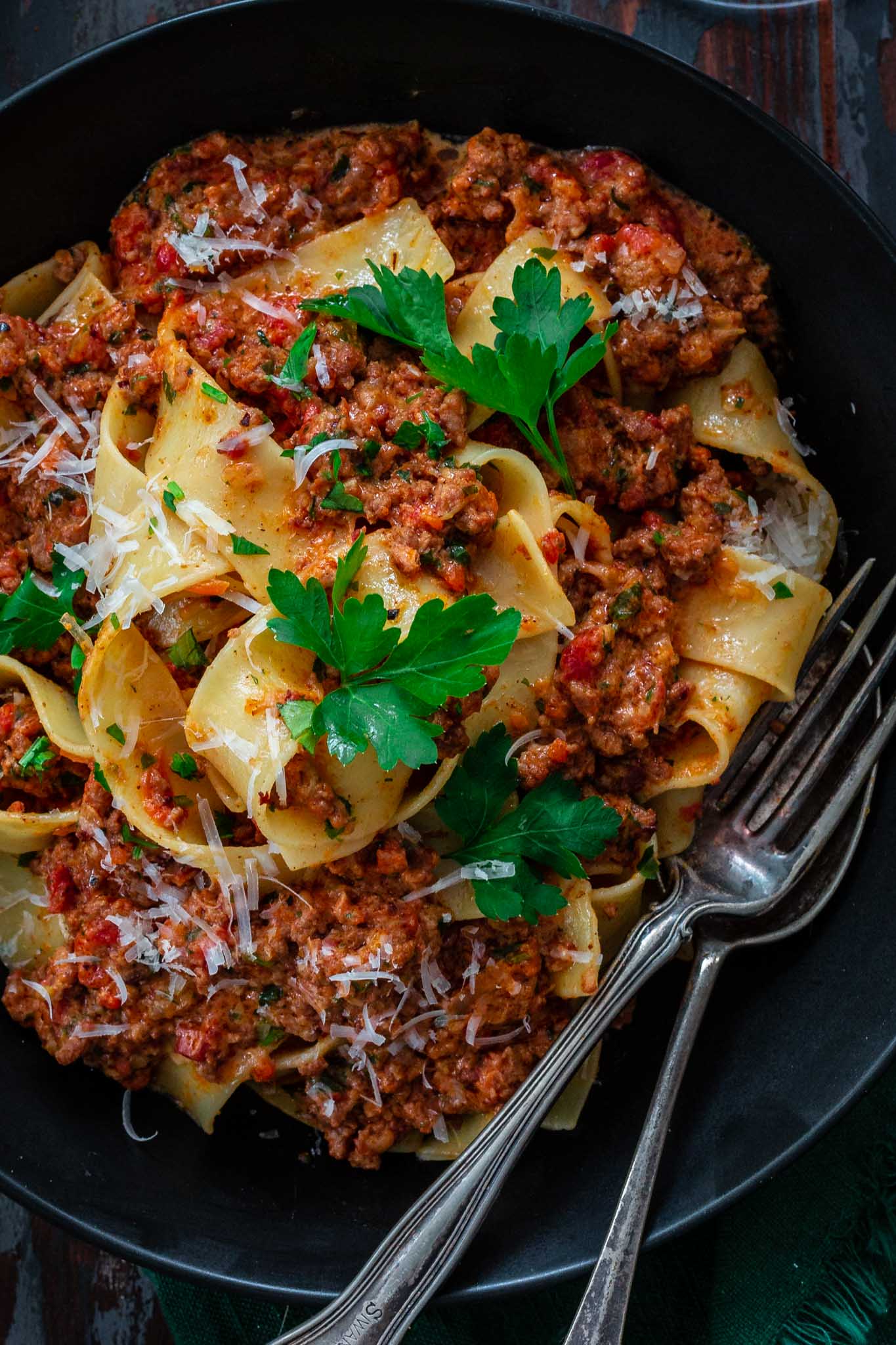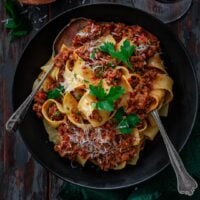How to Make Bolognese Sauce
A classic Bolognese Sauce should be in every home cook’s repertoire! My version is smooth, rich, hearty and slow cooked to perfection. The very essence of Italian comfort food!
Love Italian classic dishes? You’ll also love my Spaghetti Cacio e Pepe, Spaghetti alla Puttanesca, Lasagna Bolognese and Braised Beef Ragu.
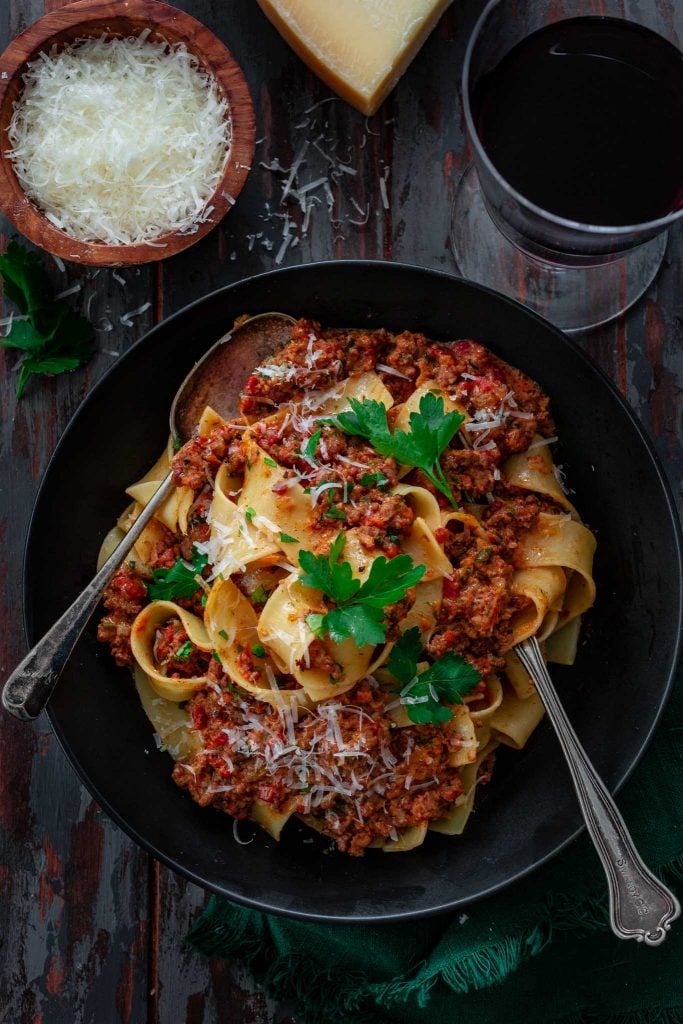
When I was little, my parents used to take us to eat at this Italian restaurant in São Paulo, called Forchetta d’Oro. It was one of those restaurants that changed their menu quite frequently, but that didn’t stop me and my brother from asking for the pasta alla bolognese. Every. Single. Time!
Thankfully, the fact that that wasn’t in the menu didn’t seem to be a problem for the chef. In fact, all it took was for the waiter to notice we were there and two big bowls of the most amazing bolognese pasta appeared – almost magically – in front of us! I don’t know if my judgement is clouded by nostalgia, but that was the best bolognese I have ever tasted. It was so smooth it would melt in your mouth!
And that’s how my obsession with bolognese sauce was born. I have since eaten many versions of this dish at restaurants – all over the world – and worked tirelessly to perfect my home cooked rendition.
So it’s with great pride that I present you my bolognese sauce! Yes, it is a labor of love. But if you love cooking, it is a great weekend project. And the results will make you famous among your friends!
What is the difference between bolognese and meat sauce?
Bolognese is a kind of ragù (the Italian word for meat sauce), original from Bologna, Italy.
It’s very different from your usual American meat sauce, often a tomato-based sauce simmered with ground beef. Bolognese is much thicker, creamier (milk is one of the ingredients) and with just a touch of tomato.
This sauce is such a classic and definitely one of those dishes that spark epic fights regarding authenticity. Traditionalists will say that tomatoes have no place in ragù bolognese (with the exception of a bit of tomato paste for color) and that garlic is a sacrilege. In fact, they’ve gone so far as to register the “true and authentic” recipe for bolognese. *insert rolling eyes here*
Well, while I think my bolognese sauce is one of the best I’ve ever had, I am refraining from calling it authentic. I do like it with a little more tomatoes than just a spoonful of tomato paste (I use peeled San Marzano tomatoes that I crush by hand) and I could never skip the garlic (garlic is LIFE)! Oh, and I also add a splash of heavy cream at the end for extra creaminess.
The results? A velvety-smooth and rich sauce that will knock your socks off! Believe me, once you try this, authenticity will be the last thing on your mind.
How to Make Bolognese Sauce
The secret to making bolognese sauce is to let it simmer for 3 to 4 hours. Yep, you heard me! Low and slow is the way to go and there is no compromising. But – trust me – it is SO WORTH IT!
My favorite way to do it is to brown the meat and sauté the veggies in a dutch oven, add the liquids and then turn the heat down and watch the magic happen while my house is taken by that unmistakable aroma of good food cooking. Can you use a slow cooker or Instant Pot instead? You sure can! I haven’t tried it myself – as making bolognese sauce is often a ritual for me – but I assume you would just sauté everything on the stove and then transfer to your machine of choice when it’s simmer time.
If you’re in a pinch and you can only cook your sauce for 1 hour, go ahead. Who am I to tell you it won’t be delicious? But it won’t be Bolognese sauce.
Soffritto: the Holy Trinity of Italian Cuisine
Almost every Italian dish starts off with soffritto, a mixture of slowly cooked onions, celery and carrots. Sometimes called battuto, it’s the Italian equivalent of the French mirepoix.
The veggies cook until soft and almost caramelized, providing a satisfying depth of flavor to the dish you are making.
Most people use a sharp knife or a mezzaluna to roughly chop the vegetables. I like to use my food processor to get them very small as I don’t want huge chunks of carrots and celery in my bolognese sauce. A good tip is to process the onions first, remove and then do the hard vegetables (carrots and celery). That way you don’t risk the onions releasing water and you ending up with a watery paste.
If you do lots of Italian cooking, it’s a good idea to make a large batch of soffritto and freeze it into smaller portions for later. It can be cooked straight from frozen, making it very convenient for busy cooks!
What meat should be used for Bolognese?
Traditionally, bolognese sauce is made with a combination of beef and pork (both ground sausage and pancetta). I’ve seen a few recipes that add veal to the mix and also some that add chicken livers.
You can certainly play around and find the combination you love the most. I do love the flavor element that the ground pork brings to the dish, so my bolognese always has both beef and pork. But if you don’t eat pork, by all means, use just ground beef.
What kind of pasta goes with Bolognese Sauce?
You will have a hard time finding Spaghetti Bolognese in Italy. I know, shocking, right? Especially when it’s such a popular dish in Italian-American restaurants.
Well, in Italy, most ragù dishes are served with thicker pasta shapes, as those are more able to hold the chunky sauce. Popular choices are tagliatelle, pappardelle and fettuccine. It’s also a must in lasagna!
That being said, I do love pairing bolognese sauce with short tube-like shapes, like penne. I love how the sauce gets captured inside the pasta!
Can I make it ahead?
Absolutely! In fact, if you can resist the temptation, I recommend making it a day before serving, as bolognese sauce tastes even better the next day! It will keep safely in the fridge for two to three days.
And while you can certainly reheat it in the microwave, I like to do it in a saucepan. First I skim off and discard the fat that solidified while the sauce was in the fridge. I then add a bit of the pasta cooking water to the saucepan and, to that, I add my sauce, letting it simmer slowly until warm.
When the pasta is ready, I toss it with most of the sauce, adding more pasta water if necessary so all the pasta is coated with the sauce. Finally, just before serving, I top with the remaining sauce for that wow factor!
How to Freeze Bolognese Sauce
If you’re making this to freeze for later, follow the recipe but skip the Parmesan cheese and heavy cream. You can then store the sauce in an airtight container, or freezer bags, in the freezer for up to 3 months.
When ready to eat, you can reheat directly from the freezer or thaw overnight in the refrigerator. Add the cheese and heavy cream once the sauce is warm.
So, what do you say? Ready to master making bolognese sauce at home?
Seriously, give this a try! Actually, go ahead and double the recipe so you can freeze some to have it whenever you’re craving comfort food. I promise you won’t regret it
More delicious Italian recipes:
- Spaghetti alla Carbonara
- Braised Beef Ragu
- Spaghetti alla Puttanesca
- Spaghetti Cacio e Pepe
- Creamy Sausage Kale Pasta
- Spaghetti Aglio, Olio e Peperoncino
Bolognese Sauce
Ingredients
- 1 tablespoon extra-virgin olive oil
- 2 tablespoons butter
- 1 large onion, finely chopped
- 2 large carrots, finely chopped
- 2 celery stalks, finely chopped
- 3 cloves garlic, chopped
- 4 ounces pancetta, diced
- 1 pound ground beef, (20% fat)
- 1 pound ground pork
- Salt and freshly ground pepper, to taste
- 1 cup dry white wine
- 1 (28 ounces) can peeled San Marzano tomatoes, hand crushed
- 1 cup whole milk
- ½ teaspoon freshly grated nutmeg
- 1 cup heavy cream, optional (see notes)
- 1 cup grated parmesan cheese, Parmigiano Reggiano is the best!
- ½ cup chopped parsley
Equipment
Instructions
- Heat olive oil and butter in a large Dutch oven, over medium high heat, until the butter is melted. Add onion, carrots, and celery, and sauté until softened and beginning to caramelize, 5 to 8 minutes. Add garlic and sauté for another couple of minutes, until fragrant. Season with salt and pepper and, using a slotted spoon, remove the soffritto to a plate and reserve.
- Add more olive oil, if needed, and add the pancetta. Cook until golden brown, about 5 minutes. Remove pancetta and reserve. Working in 2-3 batches so not to over crowd the pot, add ground beef and pork. Season with salt and pepper and cook, breaking lumps with a wooden spoon but resisting the urge to stir too often, until browned, about 10 – 15 minutes. We want the meat to caramelize and the brown bits to stick to the bottom of the pot, as that’s where all the flavor is! (See notes.)
- Return the reserved soffritto and pancetta to the pot. Add the white wine and deglaze the pan, scraping all the browned bits stuck to the bottom. Cook until the wine is mostly evaporated, about 2 to 3 minutes. Stir in the crushed tomatoes, milk, nutmeg and a pinch of salt and pepper. Bring to a boil and then lower the heat to a simmer.
- Cover and cook, stirring occasionally, for 3 to 4 hours or until the liquids have reduced and the sauce is thick. If, by then, the sauce is still too liquid-y, you can turn the heat up and boil – stirring frequently – until it reduces.Some of the fat will separate and float to the top, making it easier to skim it off with a spoon. Discard.
- Stir in heavy cream, parmesan cheese and parsley. Stir vigorously to emulsify. Taste for seasoning and adjust salt and pepper, if necessary.
- Serve, tossed with a wide pasta, like tagliatelle or pappardelle.


